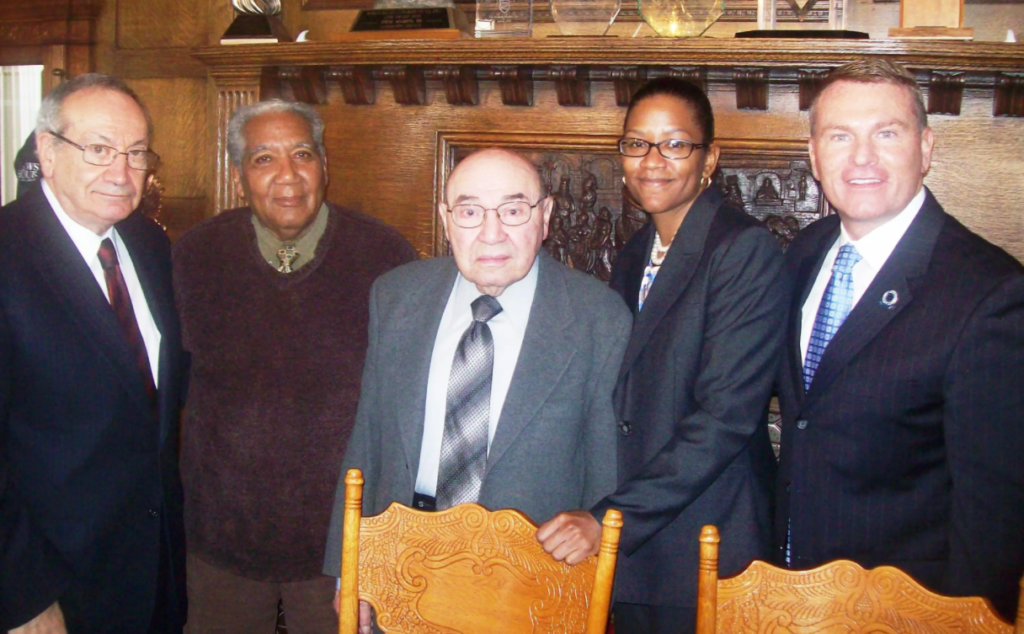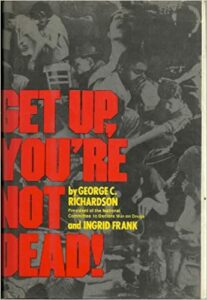Election 2021 and the Spirit of Assemblyman George Richardson

The State of New Jersey, Essex County and the City of Newark lost a giant with the death of former Assemblyman George Richardson on September 24th of this year.
A politician, an agitator, organizer, civil rights leader, and a military veteran who served with the occupational forces in Japan after WWII, Assemblyman Richardson was 91.
From his obituary:
Former NJ Assemblyman, lifelong advocate for civil rights It is with sadness that we announce the death of former State Assemblyman George Richardson on Sept. 24, 2021. Assemblyman George Richardson was a lifelong fighter for civil rights and the dignity of all people. He played an important role in the history of Newark and was essential to rise of African American political representation in the city. Throughout his long career in politics he was always a champion of building coalitions of diversity and always working to understand the needs and urgencies of even those who opposed him. He never faltered in his commitment to a strong politics of inclusion and compassion. As a father and a grandfather George was the embodiment of kindness and good humor. His family remembers him for his “militant optimism” and his boundless energy in the effort to offer help and encouragement.
He was a standout, remembered Carl Golden, former spokesman for Governor Tom Kean.
“In 1971, I returned to New Jersey from a four-year stint on the staff of U. S. Rep. Peter H.B. Frelinghuysen, lured back by a job offer from Assemblyman Tom Kean to join the very small Assembly Republican staff,” Golden told InsiderNJ. “I met Richardson at that time. He was a fascinating personality and a delight to be around. His relationship and interaction with Kean, majority leader at the time, was of a kind seldom seen anymore. They were of two exceedingly different backgrounds as well as different political parties and histories. But, they got along well and respected one another immensely. Richardson was one of those people who sticks in my mind, even after nearly 50 years in this business.”
It’s true.
Eleven years ago, InsiderNJ spent some precious time with Mr. Richardson at the North Ward Center. In attendance – and pictured above – were the late North Ward Democratic Leader Steve Adubato, Sr. (host of the event), the late Senator Robert Sarcone, former Assemblywoman L. Grace Spencer – who at the time occupied the same Newark South Ward seat Mr. Richardson had occupied and is now a judge, and Essex County Clerk Chris Durkin.
 On that day, the assemblyman talked about his political history and his fascinating story, and later graciously mailed a copy of his book, Get Up You’re Not Dead.
On that day, the assemblyman talked about his political history and his fascinating story, and later graciously mailed a copy of his book, Get Up You’re Not Dead.
Born in Down Neck to African American parents who moved to Newark from the Deep South, Mr. Richardson immersed himself as a young man in Democratic Party politics following his bad conduct discharge from the army Air Force. A hard luck street kid turned success story as an undaunted community leader, he forced his way into elected office as the only African American to serve in the Assembly during the Kennedy years.
His perceived radical tendencies and penchant for delivering civil rights speeches on the floor of the Statehouse quickly ran him afoul of the Essex County bosses, who in Mr. Richardson’s view were more focused on the Passaic Valley Sewerage Authority than “I have a Dream.”
Just as jittery was Mayor Hugh Addonizio, who made the 29-old Central Warder his commissioner of insurance, then six months later watched in horror as the upstart black joined a police brutality protest in front of City Hall.
“George, you can’t do that,” a visibly hurt Addonizio later told him. “You go out there like that, that means you’re against me.”
“I’m not against you,” Richardson objected. “I’m against a pregnant woman getting beaten up by the cops.”
Mayor Addonizio commiserated with legendary Party Chairman Dennis Carey, who in 1953 took charge of a county with a freeholder board that at that time was 9-0 in Republican hands, drove the first Essex Democrat in 47 years into the senate in 1955, and by 1959 had transformed Essex into a Democratic Party stronghold.
Of course, Mr. Richardson was already giving him fits.
This was in the days when it was one senator per county – 21 Senators total. Assemblymen were supposed to be nobodies, a concept Assemblyman Richardson apparently didn’t grasp.
But Carey had another problem too as he headed toward the 1963 election, and that was his top of the ticket candidate, state Sen. Donal Fox, his onetime crowning glory. Carey and Fox constantly squabbled over sewerage authority appointments before the exasperated chairman finally decided to cut the senator loose – along with Richardson. Assembling a new ticket, Carey dumped the pair of recalcitrants and made Assembly Speaker Elmer Matthews, a book smart lace curtain Irish attorney born in South Orange, his senate candidate.
Running with Matthews was an up-and-coming Irish immigrant out of the West Ward named John Cryan, father of future State Party Chairman Joseph Cryan.
Jettisoned by the organization, Mr. Richardson promptly filed to run for the senate as a New Frontier Democrat.
“We were taking our cue from what was happening down south in the civil rights movement,” said Richardson, who attended the 1963 March on Washington. “Imagine – a northern city like Newark without a black anything: no black sales clerks, no black bus drivers. We needed something to confront that.”
He knew he couldn’t win. He wanted to give his party a jolt.
Following up on his earliest efforts to unite business leaders in the cause of building an integrated work force, Richardson ran as the leader of a slate of African American and Latino candidates.
A former Addonizio campaign manager who enjoyed the mayor’s friendship in addition to deep neighborhood sympathies, Robert Sarcone ran in Democratic Essex as a cross-over candidate, aided by the public’s distress over Gov. Richard Hughes’s $750 million Turnpike bond issue, and – thought many observers – Richardson’s decision to run as a kamikaze.
“Party didn’t matter to Italians who backed the candidacies of Addonizio, Sarcone, and Rodino,” explained Assemblyman Ralph Caputo (D-28). “There was a tremendous ethnic affinity toward all three of them.”
On Nov. 5th, 1963, Sarcone won 125,836 votes to Matthews’s 109,934. Richardson trailed with 10,057 votes. Matthews won only Irvington, Newark and Orange, but won Newark overall by 17,000. The Assembly seats split: five Republicans and four Democrats. Four years earlier, Fox had beaten his Republican opponent, Alfred C. Clapp, 126,800 to 112,218.
Trailing Democratic Party bitterness despite the numbers’ revelation that he wasn’t really a spoiler, Mr. Richardson went back to his community organizing roots and work as a barkeep at Knobby’s on Bergen Avenue.
“I wasn’t playing politics, I was trying to inject civil rights into politics,” he said. “We were running to prove a point and to have our voice heard.”
Richardson backed Ken Gibson over an unraveling Addonizio in the 1970 mayor’s race, and took his lone stab at a congressional run, perhaps inevitably proving an independent entity again as he broke from Black Power poet/activist Amiri Baraka and split the black vote with William Hart of East Orange, Baraka’s candidate from the 1970 Black and Brown Convention.
“I got beat up too,” Richardson told Sarcone with a laugh. “I ran against Rodino for Congress and I loved Rodino, but this was a Democratic Primary and I remember a campaign slogan I used that still bothers me a little bit. I know it bothered Pete. ‘Rats, Roaches and Rodino.’ Anyway, he was popular in the black community. He beat me.”
Earlier this month, Governor Phil Murphy ordered that the U.S. and New Jersey flags be flown at half-staff at all state buildings and facilities on Friday, October 15, 2021, to honor the passing of Assemblyman and civil rights leader George Richardson.
“A maverick civil rights leader, Assemblyman Richardson was an exemplary public servant who dedicated his entire life to dismantle the legacies of systemic racism,” said Governor Murphy. “Although, we lost Assemblyman Richardson, his legacy will continue to live on. Tammy and I send our condolences to his family and loved ones during this difficult time.”
Copy of Executive Order No. 268
The following excerpt is from the classic Get up You’re Not Dead, which describes military veteran George Richardson’s efforts to try to get a trade job following his discharge:
Sunday I bought the Newark News and the Star Ledger and checked off all the carpenter ads in the help wanted section. There wasn’t more than a dozen and I drew circles around them that was near a bus line. Seven on Monday morning, I was at the first place on Frelinghuysen Avenue, with my discharge papers folded in my pocket and my hands itching to hold a saw and hammer. It was a small place, and I went up to the man that looked like the boss.
“I’m here about your ad for a carpenter. I just got out of the army and got training as a carpenter.”
He was a shot, squat white man, and he looked at me sort of funny before he said, “What local?”
“What do you mean by what local?”
“What local of the carpenters union do you belong to?”
“I don’t belong to the carpenters union.”
“Sorry. We only hire union.”
I wasn’t discouraged. It was only the first job, but at the next place they didn’t hire nothing but union either. And at the next too. By the end of the day, every place every place told me they didn’t hire nothing but union.
The next day I looked up the carpenters union in the phone book and went there. The place was almost empty and a white cat behind a desk yelled for me to come into his office.
“I want to join the union.”
“We ain’t taking new members.”
“How come?”
“Because we got enough.”
“When you gonna take mew members?”
“How the f**k should I know?”
“How do I get in the carpenters union?”
“Leave your name and address.” He ripped a piece off the newspaper he was reading and handed it to me. “Here, write it in the margin. We’ll call you when something turns up.”
It wasn’t even lunchtime when I got to Tully’s, but about twenty cats was already sitting around the bar. I ordered a shot and sat staring into the glass, thinking about how the f**k I was gonna get into the carpenters union, when Pop Pease sat down next to me. “What’s the matter, George? You look sick.”
“No, man. I’m just mad. I ain’t got no job yet.”
“It takes time to find work, George. You ain’t been looking long.”
“Yea, but every place I go they tell me they only hire union, and when I went to join the union, they said they wasn’t looking for no new members.”
“What kind of job are you looking for?”
“Carpenter.”
“Man, you’re the dumbest dude I ever seen.”
Pop then explains to George Richardson that they don’t let Blacks join the union.
Not only would George Richardson ultimately force his way into a job, but he would become a vital part of New Jersey’s political history, who refused to sacrifice his principals to the machinery of complacency, as he sought a better life for the people he served. In 2010, he was determinedly engaged in supporting the national efforts of President Barack Obama.
May Assemblyman George Richardson of Newark rest in peace.








Leave a Reply